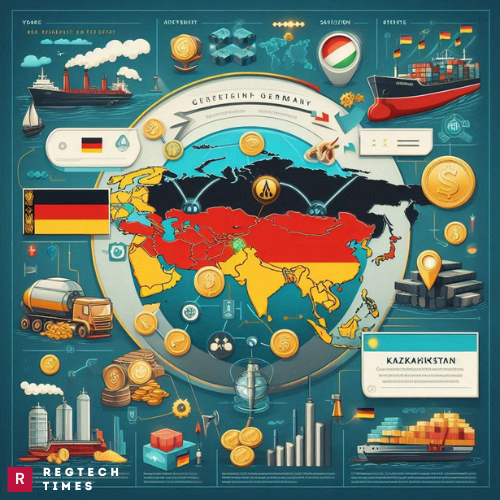Germany’s Chancellor Olaf Scholz’s recent visit to Kazakhstan underscores a significant shift in Germany trade strategy as Europe adjusts to the aftermath of Russia’s invasion of Ukraine. With Western sanctions increasingly targeting Russia’s economy, Germany is actively seeking to diversify its trade relationships, and Kazakhstan is emerging as a pivotal partner in this new economic realignment.
Enhancing Germany Trade Relations
Following the Russian invasion of Ukraine in February 2022, the West, including Germany, imposed a series of robust sanctions aimed at crippling Russia’s economy. These sanctions have had a profound impact on various sectors, particularly energy and technology. In response, Germany is strategically expanding its trade networks to reduce dependence on Russian resources. Kazakhstan, with its vast reserves of oil, rare earths, and lithium, is central to this strategy of diversifying Germany trade.
Kazakhstan’s role in Germany trade has become increasingly vital. The Central Asian nation has stepped in to supply crude oil to Germany’s Schwedt refinery, a significant shift from relying on Russian oil. This adjustment not only demonstrates Kazakhstan’s importance in Germany’s energy strategy but also highlights the growing significance of Germany trade with Kazakhstan in ensuring energy security and economic stability for Germany.
Kazakhstan’s Strategic Importance
Kazakhstan’s geographic and historical ties with Russia make it a critical player in the region’s trade dynamics. Despite these connections, Kazakhstan’s government, under President Kassym Jomart Tokayev, has committed to complying with Western sanctions against Russia. This compliance is crucial for Germany as it ensures that its expanded trade with Kazakhstan does not inadvertently support Russia’s efforts to evade sanctions.
China Warns Germany Over Provocative Taiwan Strait Passage
Chancellor Scholz emphasized the importance of maintaining a transparent and cooperative trade relationship, stating, “I am grateful for the trusting dialogue between us, through which we want to prevent trade between us from being misused to circumvent sanctions.” This commitment reflects Germany’s focus on ensuring that its trade with Kazakhstan aligns with international sanctions, thereby preventing any misuse of trade routes.
Balancing Trade Expansion with Sanction Enforcement
Germany’s engagement with Kazakhstan highlights the challenge of balancing trade expansion with the need to enforce sanctions effectively. As Western nations seek to diminish their reliance on Russian resources, Kazakhstan’s role as a supplier of critical materials becomes increasingly crucial. However, Germany must navigate this relationship carefully to ensure that increased Germany trade does not undermine the broader sanctions framework.
This diplomatic outreach to Kazakhstan is part of a broader Western strategy to fortify ties with Central Asian nations, which have traditionally been within Russia’s sphere of influence. By strengthening Germany trade with Kazakhstan, Germany aims to achieve greater economic stability and resilience. This strategic engagement also addresses Russia’s recent threats to limit sales of key metals to “unfriendly” nations, further highlighting the importance of secure and reliable trade partnerships.
Future Implications for Germany Trade
Chancellor Scholz’s visit to Kazakhstan marks a significant development in Germany trade strategy. As Germany deepens its economic relationship with Kazakhstan, it must continue to navigate the complexities of international sanctions and geopolitical tensions. This approach not only aims to stabilize Germany’s economic environment but also contributes to broader Western efforts to address regional challenges in Central Asia.
The growing partnership between Germany and Kazakhstan exemplifies the need for careful management of international trade relationships. By focusing on transparent and compliant trade practices, Germany is positioning itself to enhance economic stability and resilience. This strategic balance is essential for thriving in an increasingly complex global trade landscape marked by geopolitical uncertainty.
Chancellor Scholz’s visit to Kazakhstan represents a crucial pivot in Germany trade strategy. As Germany seeks to diversify its trade relationships and secure vital resources, its engagement with Kazakhstan is both a strategic opportunity and a challenge. Balancing trade expansion with effective enforcement of international sanctions is vital for achieving stability and resilience in Germany’s economic relations. This strategic approach not only benefits Germany but also supports broader Western efforts to navigate the complexities of global trade and geopolitical tensions.


